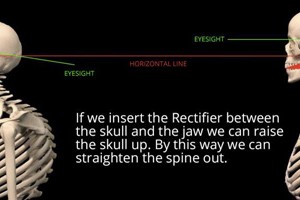Is The Jaw The Most Important Joint In The Body?
Posted Nov 24, 2020 at 08:14
Posted Nov 24, 2020 at 08:14

The jaw, often referred to as the TMJ( Temporal Mandibular Joint) and works together with the top 3 vertebrae in the neck, in supporting the skull, maintaining the neutral position of the eyes, aiding in eating, breathing and speaking. Dysfunction in the jaw can result in an altered skull and neck position, placing uneven stress on the joints and tension in the muscles of the neck.
This dysfunction can be caused by a change in bite ( e.g over or under-bite), trauma to the face and/or mouth, missing or additional teeth, bridges, braces and more. These changes in jaw position, no matter how long ago in life, will affect your neck position and over a period of months and years will become your brain's �new default position�. This will gradually impact your entire body moving forwards, starting off as a snowflake and eventually building into an avalanche.
The illustration above shows an example of good/normal posture (right) compared to how jaw dysfunction can affect it (left). The diagram on the left shows how the person has jaw dysfunction causing them to altered body posture and spinal curves.
In order to keep some balance in the body the brain will alter the position of the rest of the spine to compensate. What this does is alter the weight and tension on the left and right sides of the body and similar to the tracking on a car, if there is too much weight on the tires one side they will wear faster than those on the opposite side.
This posture is developed over a period of weeks, months and years as a result of dysfunction in the jaw, until the pattern is broken and the jaw corrected the body and brain will remain in this posture.